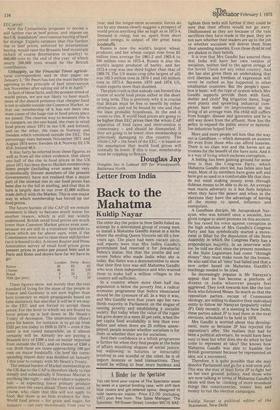Letter from India
Back to the Mahatma
Kuldip Nayar
The other day the police in New Delhi foiled an attempt by a determined group of young men to install a Mahatma Gandhi statue in a niche where the smiling Queen Victoria sat till a few years ago. The place had been vacant since, and reports were that Mrs Indira Gandhi's government had reserved it for Jawaharlal Nehru's statue. Not that the youths did not revere Nehru who made India what she is today. But theirs was a demonstration to show that their first love was still Mahatma Gandhi who won them independence and who wanted them to make half a million villages in the country self-sufficient.
In a country where more than half the population is below the poverty line, a radical economic programme that Nehru enunciated should be the cynosure of all. In a way it was, and Mrs Gandhi won four years ago her two thirds majority in Parliament on the slogan of ousting poverty and establishing a socialist society. But today when the value of the rupee has gone down to a mere 35 per cent, when the per capita food availability is less than ever before and when there are 25 million unenri ployed, people wonder whether socialism is for them or whether they are for socialism. And their confidence in a leftish programme is further hit when they find people at the helm of affairs mouthing slogans of social justice, but wallowing in luxuries or intractably involved in one scandal or the other, be it of import licences or land transactions. They would be willing to bear more burdens and
tighten their belts still further if they could be sure that their efforts would not go awry. Disillusioned as they are because of the vain sacrifices they have made in the past, they are not sure whether their leaders are up to the job or whether socialism will deliver them from their unending miseries. Even those dyed in red are shaken in their beliefs.
• It is true that Mrs Gandhi has assured them that India will have her own version of socialism, neither tied to the apron strings of the Soviet Union nor any other country. And she has also given them an undertaking that civil liberties and freedom, of expression will never be curbed •as has happened in other totalitarian countries. But the people's question is basic: will the type of system which Mrs Gandhi supports provide them with food, shelter and cloth? Big irrigation dams, huge steel plants and sprawling industrial complexes have made no improvement in the living of an average man, His child still suffers from hunger, disease and ignorance and he is still way down from the affluent. How has the policy to expand the public sector or nationalise industries helped him?
More and more people tell him that the way out is Gandhism — which demands an austere life even from those who can afford luxuries. There is no class war and the haves act as trustees for the benefit of the have nots. And it is a way of living which eschews corruption.
A feeling has been gaining ground for some time is that the Congress Party, which Mahatma Gandhi once led, has fallen into bad ways. Most of its members have gone soft and have got so used to a comfortable life that they do not mind making money even through dubious means to be able to do so. An average man reacts adversely to it but feels helpless when they havethe power and when in the 'elections they have the advantage of having all the money to spend, influence and manipulate.
A Gandhian disciple, Mr Jayaprakash Narayan, who was himself once a socialist, has given tongue to silent protests on this account. He has raised his voice against corruption in the high echelons of Mrs Gandhi's Congress Party and has symbolically started a movement in Bihar for the dissolution of the State Assembly in which the Congress Party has a preponderant majority. In an interview with me, he told me that since the present members of the State Legislature had come "through Money" they must make room for the honest. He also said that all 'isms' had failed and that a new order based on Mahatma Gandhi's teachings needed to be tried.
So increasingly popular is Mr Narayan's appeal that he has become a platform of dissent in India wherever people feel aggrieved. They look towards him like the lost flock who followed Moses. So much so that the opposition parties, except of Communist ideology, are willing to dissolve their individual, entity to follow Mr Narayan (popularly called JP). Only recently, at a meeting in New Delhi, these parties asked JP to lead them in the next elections, scheduled to be held in 1976.
Mrs Gandhi is worried about this development, more so because JP has rejected the opposition's offer. She realises that had he been a political adversary, he would have been easy to beat but what does she do when he has come to represent an idea? She knows how Mahatma Gandhi was able to humble the British government because he represented an idea, not a movement.
Therefore, it is quite possible that she may dissolve Parliament and go for a mid-term poll: This way she may at least force JP to fight her on her own ground: politics. And those who are now talking in terms of Mahatma Gandhi's ideals will then be thinking of more mundane things like constituencies, voters' lists and money to run the election campaigns.
Kuldip Nayar is political editor of the Statesman, New Delhi


































 Previous page
Previous page